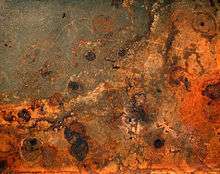Rust (color)
Rust is an orange-brown color resembling iron oxide. It is a commonly used color in stage lighting and appears roughly the same color as photographic safelights when used over a standard tungsten light source.
| Rust | |
|---|---|
| Hex triplet | #B7410E |
| sRGBB (r, g, b) | (183, 65, 14) |
| CMYKH (c, m, y, k) | (22, 85, 100, 13) |
| HSV (h, s, v) | (18°, 92%, 72%) |
| Source | Internet |
| ISCC–NBS descriptor | Deep reddish orange |
| B: Normalized to [0–255] (byte) H: Normalized to [0–100] (hundred) | |
The first recorded use of rust as a color name in English was in 1692.[1]
Origin
Rust is named after the resulting phenomenon of the oxidation of iron. The word 'rust' finds its etymological origins in the Proto-Germanic word rusta, which translates to "redness." The word is closely related to the term "ruddy," which also refers to a reddish coloring in an object.
gollark: ^
gollark: Try Solus OS, actually, that's quite cool.
gollark: Most of the time, default stuff works, but you may not want default stuff.
gollark: Amazingly, sometimes you may need to change a thing.
gollark: Hardly.
References
- Maerz and Paul A Dictionary of Color New York:1930 McGraw-Hill Page 203; Color Sample of Rust: Page 35 Plate 6 Color Sample A12
See also
- List of colors
This article is issued from Wikipedia. The text is licensed under Creative Commons - Attribution - Sharealike. Additional terms may apply for the media files.
